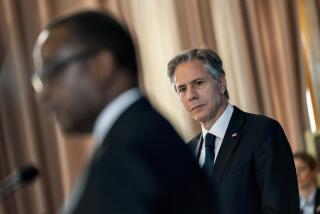U.S. Vague on Its Indonesia Goals
- Share via
WASHINGTON — President Clinton called Monday for an Indonesian “political dialogue” to end the crisis in the riot-scarred Southeast Asian archipelago, but he and his administration refused to say what outcome would please the United States.
As the situation in Indonesia became more confused, the administration left its policy goals deliberately vague. Assistant Secretary of State Stanley O. Roth told Congress that the administration did not want “to further stir the pot in an already very tense situation, possibly getting out something we don’t want.”
In testimony on Capitol Hill, Roth resisted repeated pressure from senators to state that the United States wants Indonesian President Suharto to leave office. But he said the administration is not “wedded to Suharto” and is trying to make that clear to the Indonesian leader.
Clinton, speaking at a London news conference after a U.S.-European Union summit, set the administration stance as an interested but hands-off observer. Expressing hope that civil society will flourish in Indonesia, he characterized the political dialogue he wants only as one “that gives all parties [in Indonesia] a substantial feeling they’re part of it.”
Meanwhile, international officials indicated that the International Monetary Fund probably will postpone a decision on whether to continue lending to Indonesia until the political situation there clears up.
Also, the World Bank and the Asian Development Bank postponed action Monday on about $2.7 billion in Indonesian loans that they had been scheduled to approve.
At a meeting of a Senate Foreign Relations subcommittee on East Asia, Roth tried to explain the administration’s policy and deny its seeming lack of focus.
“The United States needs to make clear to Suharto, the military and Indonesians in general,” Roth testified, “that while we are concerned with the stability of their country . . . that doesn’t mean we are wedded to Suharto as the price of stability.
“We need to get Suharto to come to the realization that some kind of political reform is not only desirable but, given the mood of the country, inevitable,” he continued. “He needs to understand that he can either ride the wave or be swamped by it.”
This provoked Sen. John F. Kerry (D-Mass.) to say that “it seems to me the message is very simple and very direct: President Suharto has to go.”
But that was clearly too direct for the administration.
“Indonesia is teetering on the brink of a political and social cliff. If it falls, the domestic ramifications for Indonesia are staggering,” Roth said. “ . . . We need to make sure that when historians look back at the watershed, no one can say that our action or inaction helped push the country off the cliff.”
Trying to explain the kind of political dialogue the administration wants to promote, Roth cited a meeting of students and legislators in Jakarta earlier in the day. After it, the speaker of the Indonesian parliament called for Suharto to resign, and Indonesian media reported that he would. Roth, however, said the administration could not confirm the reports.
Roth said that Clinton and other members of the administration have been privately telling Suharto of the need for political reform for more than a year.
Referring to the Indonesian military, regarded by most analysts as a key factor in any succession, Roth said that military officials have told the administration in meetings “that they’re anxious to avoid violence. They have said this on multiple occasions.”
Times staff writer Art Pine contributed to this report.
More to Read
Sign up for Essential California
The most important California stories and recommendations in your inbox every morning.
You may occasionally receive promotional content from the Los Angeles Times.













